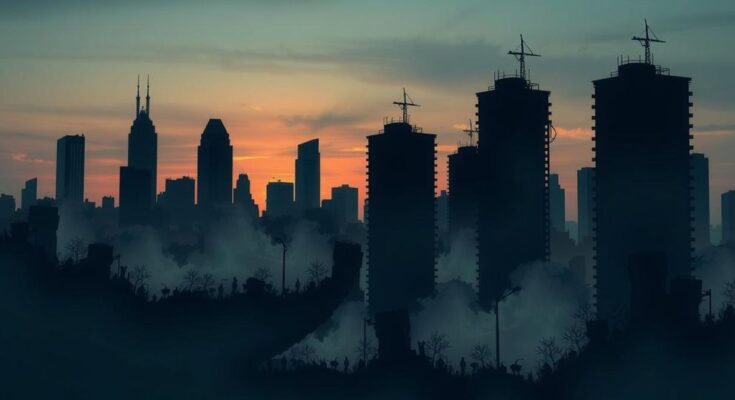Rwanda-backed rebels have reached the center of Bukavu, Congo’s second-largest city, with minimal resistance from government forces. Observers noted public support for the M23 rebels, who are aiming for political control in an ongoing conflict that has displaced millions. The situation underscores a larger humanitarian crisis and raises concerns about regional stability.
On Sunday morning, Rwanda-backed rebels advanced to the center of Bukavu, East Congo’s second-largest city, with minimal resistance from government forces, marking a significant escalation in their ongoing conflict. Associated Press journalists observed numerous residents expressing support for the M23 rebels as they traversed the city following a long march from Goma, which they captured last month. However, many areas of the city were largely deserted as inhabitants remained indoors.
The M23 rebels, among over 100 armed factions in eastern Congo, have gained support from approximately 4,000 Rwandan troops, according to the United Nations. This ongoing violence has contributed to the world’s most severe humanitarian crisis, displacing over six million individuals in the region, with an estimated 350,000 left homeless due to the rebels’ recent advances.
It remains uncertain if the M23 rebels have taken full control of Bukavu, a city with a population of about 1.3 million. The rebels have strategically positioned themselves at the South Kivu administrative offices and other key locations throughout the city, yet on Sunday, there were no visible signs of armed conflict or Congolese military presence in most areas.
Blaise Byamungu, a resident of Bukavu, commented on the situation, lamenting, “The rebels marched into the city that was abandoned by all the authorities and without any loyalist force.” He criticized the government’s inaction, questioning, “Is the government waiting for them to take over other towns to take action? It’s cowardice,” illustrating the locals’ frustration with their leadership during the crisis.
Contrary to the 2012 conflicts surrounding Goma, there are indications this time that the M23 rebels may have political ambitions. Congolese soldiers were reported fleeing alongside many civilians as chaos and looting erupted during the advance into Bukavu. President Felix Tshisekedi convened a security meeting in Kinshasa, asserting that while Bukavu faced a brief incursion by M23, Congolese forces and local militia allies still retain control over the city.
Concerns have been expressed regarding the potential regional implications of the conflict. In support of local forces in Bukavu, troops from Burundi are stationed, while South African forces assist in Goma. Burundi’s President Evariste Ndayishimiye suggested non-retaliation against the conflict in a public statement.
The African Union summit recently highlighted the importance of addressing the conflict, with UN Secretary-General António Guterres stressing the need to respect Congo’s sovereignty. Despite calls for ceasefire and dialogue, decisive action against the M23 rebels or Rwanda has been hesitant from African leaders and the international community.
In a statement, the Congo River Alliance, which includes M23, pledged support for the citizens of Bukavu, asserting their commitment to maintaining control. Lawrence Kanyuka, the spokesperson for the alliance, urged residents to remain calm, urging them to “control their city and not give in to panic.”
The ongoing conflict in eastern Congo is intertwined with a prolonged ethnic struggle, with the M23 asserting they are defending the rights of Tutsis in the region. Rwanda has echoed these claims, alleging persecution of Tutsis by Hutus and armed groups connected to the Rwandan genocide, while the Congolese military disputes such allegations.
In summary, the advancing M23 rebels’ capture of strategic positions in Bukavu reflects a significant escalation in the ongoing conflict, with implications for regional stability. Amidst the humanitarian crisis affecting millions, local tensions, and political aspirations of the rebels, detailed attention from the international community remains crucial. Calls for a ceasefire and dialogue are essential as the situation develops.
Original Source: jamaica-gleaner.com




